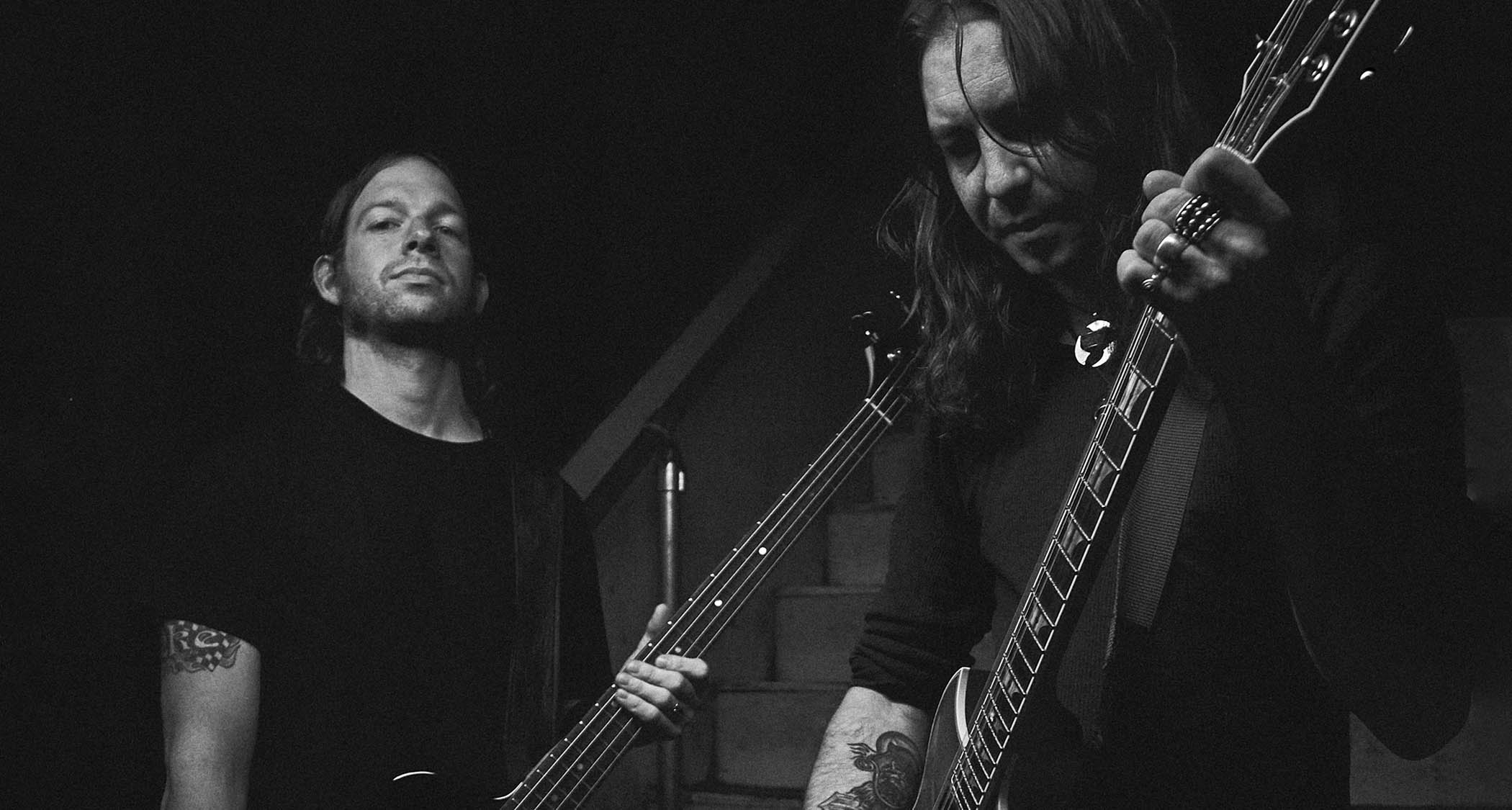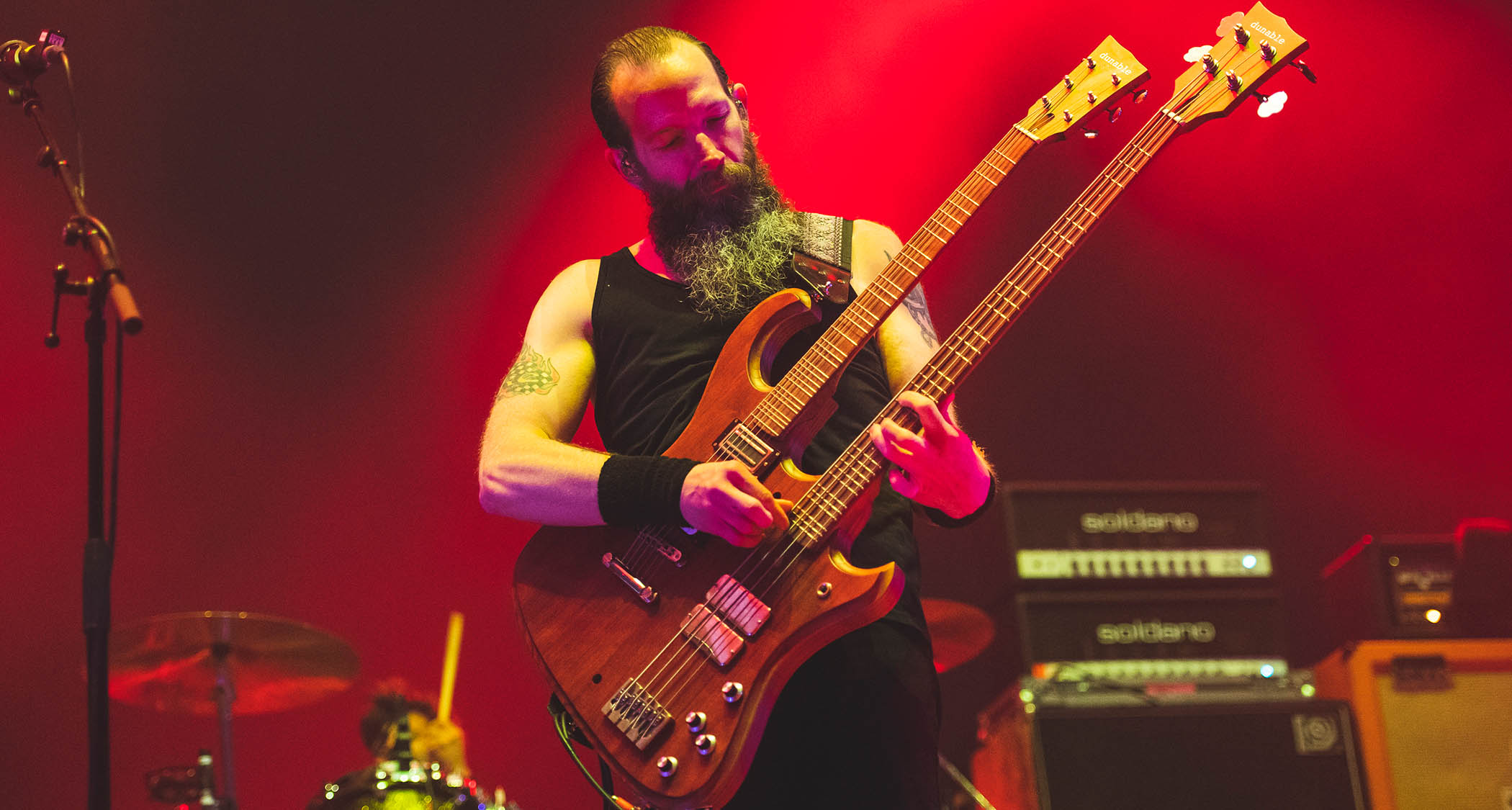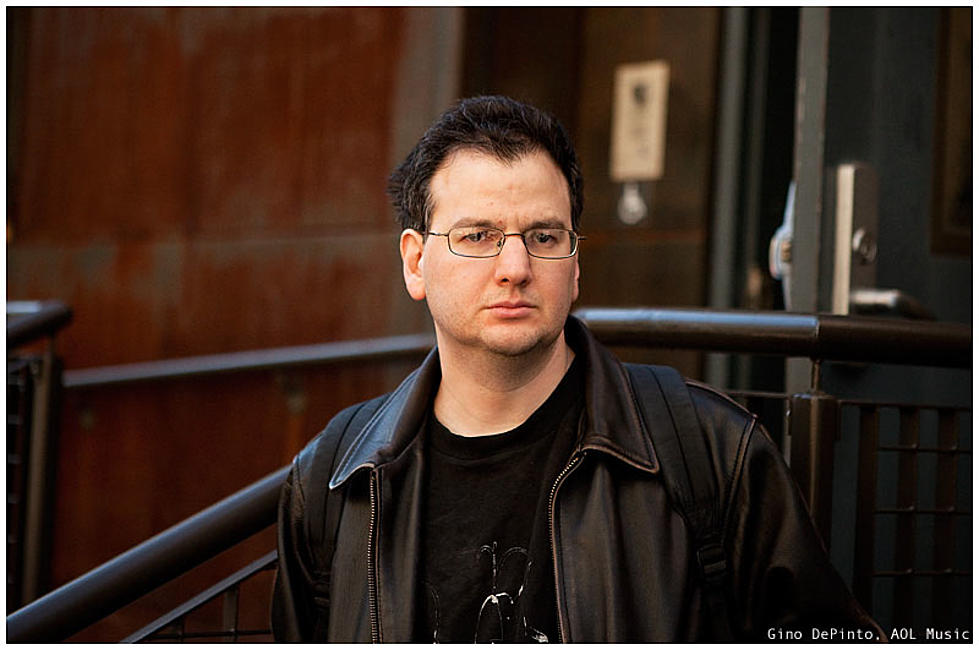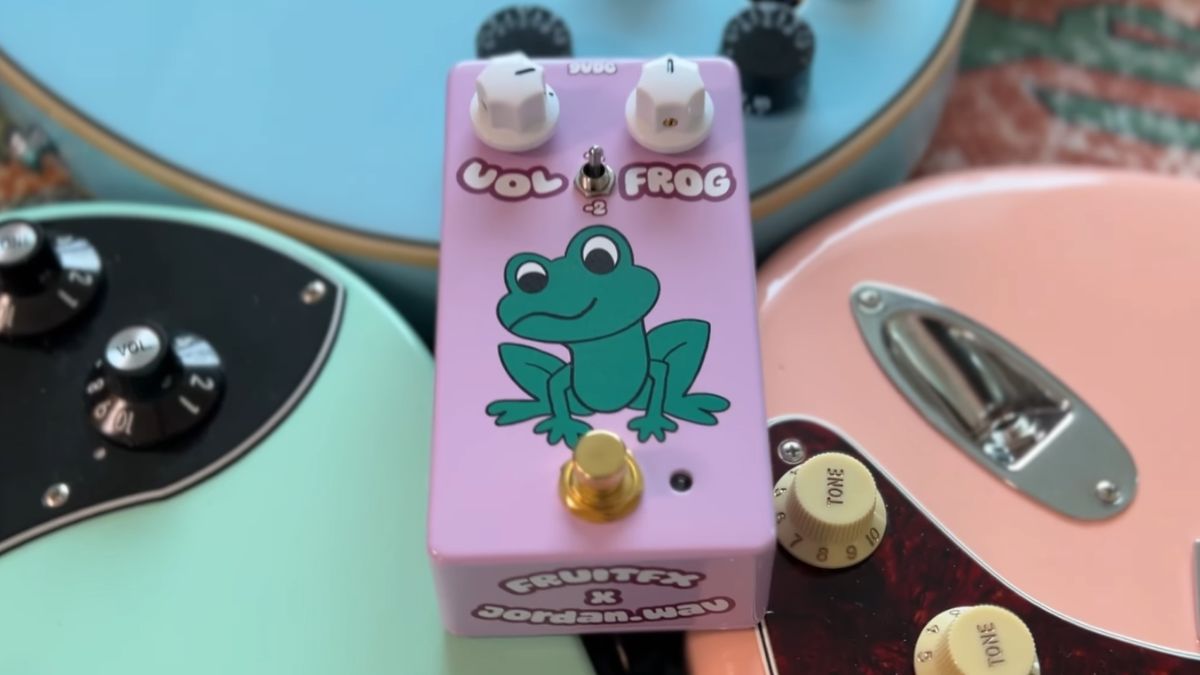“I drank my liver into submission and snorted a mountain of cocaine, and I didn’t die. Now I’m trying to stay away from that stuff so I can still be around. I keep myself really busy with music”: The redemption of High on Fire and Sleep icon Matt Pike
All raw metal riffs and off-kilter tonalities, High on Fire’s Cometh the Storm is the return we’ve been waiting for. As Matt Pike and Jeff Matz explain, it is the product of overcoming depression, insecurity and illness – and indulging their progressive tendencies

All the latest guitar news, interviews, lessons, reviews, deals and more, direct to your inbox!
You are now subscribed
Your newsletter sign-up was successful
Hornets’ nest guitar buzz, dark, doomy riffs and rhythms as foreboding as torrential thunderstorms are what make High on Fire heavy. What makes them stand out from their stoner-metal peers, however, is the way they imbue Sabbathian sludge with ’80s metal hooks, thrash attitude, psychedelic swirls and authentic Turkish folk melodies.
“I never wanted to be just a doom band,” says frontman Matt Pike, who cut his metal teeth in the ’90s with drone legends Sleep. “When we formed High on Fire, I was thinking we’d be more like Celtic Frost with maybe a little black metal in there. But that was just a starting point.”
Since they surfaced from their Lovecraftian netherworld in 1998, Pike and his bandmates have explored multiple styles and subgenres. Their version of metallic doom gradually evolved into a faster animal heavily influenced by Motörhead and snarling biker metal. Then the band pumped the brakes a bit and upped their songwriting game, shifting up the rhythms and switching between various landscapes of fist-tight, mid-paced metal.
“Growing with this band has been like learning a language,” Pike says. “At first, you’re figuring out how to pronounce things, and then you’re expanding your vocabulary. By the time you step into the world and start to travel, you get exposed to all these accents and different languages, and you include some of that in what you do as well. You’re no longer just talking in your native language, so you’re always developing.”
Nearly 25 years and eight albums since High on Fire released their 2000 debut, The Art of Self Defense, the trio has reignited the metal scene with Cometh the Storm, a twisting, entrancing contrast of scorched-earth riffs, searing hooks and subtle, spacey interludes. It’s plodding, plundering and progressive – more of a musical journey than an aural assault.
“I’ve discovered that people’s ears react well to a melody that’s voiced on guitar,” says bassist Jeff Matz, who writes on guitar and has played a major role in High on Fire’s songwriting since he joined for 2007’s Death Is This Communion.
“It’s helpful for us to start off by going one-on-one with a guitar and drums just to get some good ideas going. When we have something we like, we take it from there and start filling in the other music colors and making some noise.”
All the latest guitar news, interviews, lessons, reviews, deals and more, direct to your inbox!
High on Fire’s ability to combine heaviness with tunefulness has earned them tours with a wide range of death metal, thrash, metalcore, stoner and experimental bands, including high-profile gigs with Metallica, Megadeth, Mastodon and Melvins.
It sucks because we got a Grammy for Electric Messiah, and then we couldn’t play the tour for it. Our pay for those shows went through the roof; we just never made it to the shows to get paid
Matt Pike
More than six years in the making, Cometh the Storm is rife with the spirit of invention. In some ways, it’s a natural evolution from 2018’s chugging, churning Electric Messiah, the title track of which won a Grammy for Best Metal Performance.
And the album has triggered a new level of excitement following Pike’s descent into depression, insecurity and illness, much of which was caused by an abrupt halt of momentum during the pandemic shutdown and the financial sinkhole that threatened to swallow the industry veteran.
Critics, fans and other musicians have consistently praised High on Fire, yet the band has never enjoyed huge album sales and had only just graduated to marquee-level success in 2020 when the pandemic lockdown began, leaving Pike and his bandmates in a difficult financial position.
“I’ve had a pretty rough time with coming out of being wildly successful to Covid shutting everything down – and having to pay the interest rates on the bills from when I was wildly successful,” Pike says.
“So that’s been a rough run, and it has taken up a lot of my time trying to be creative again and develop my career. It sucks because we got a Grammy for Electric Messiah, and then we couldn’t play the tour for it. Our pay for those shows went through the roof; we just never made it to the shows to get paid.”
During the downtime, Pike released the side project Pike vs. the Automaton, remastered and reissued The Art of Self Defense (with their 1999 demo as a bonus) and released the book Head on a Pike: The Illustrated Lyrics of Matt Pike.
“I had a lot of things on the stove, but I couldn’t make any income from them until they were done,” Pike says. “And, with the current interest rates in the United States, I was trying to keep my head above water and I had to learn to get creative about the way I made money.
“I can’t dig ditches anymore because I have peripheral neuropathy [a degenerative nerve cell condition that causes numbness, tingling and pain in the toes, feet, legs, fingers, hands and arms]. I could probably be a bouncer, but I really don’t want to work in a bar. Given my history with alcohol, it’s not a good place for me. So I had a lot of things to work out.”
The Matt Pike that surfaced on the other side of existential crisis might surprise longtime High on Fire fans. Though he shows up for our interview slightly late and a bit frazzled, he looks pretty sharp, dressed not in metal garb, but in a collared cream-colored shirt patterned with circular red designs.
The top few buttons are undone, and the left and right edges of the shirt frame two brown rope necklaces and a silver horseshoe pendant. A thick ’70s porn mustache sits prominently above Pike’s beard scruff, and, at first glance, it looks like his hair is tied back in a ponytail.
But nope, he’s actually sporting short hair for the first time since he started growing his locks as a kid in the early ’70s. It’s not an intentional part of an image overhaul, but Pike liked the way it looked and has kept it short for the last year – even though it was originally meant to be a makeshift disguise.

“I was in the Czech Republic on my 50th birthday, and I cut it myself when I was shrooming,” he says. “My mother was a hairdresser, so maybe it runs in the family. I hadn’t planned to cut it. I wasn’t drinking, so I did a bunch of mushrooms and went to the Czech casino. But I started winning a lot of money once the shrooms kicked in.
“Then I started freaking out because there were some very large gentlemen that were not happy about me winning and being kind of psychic about their weird roulette game. So I chopped my hair off to keep them away. And it’s been that way ever since. It’s kind of nice. There are benefits to having cropped hair. I’m sure any Spartan gladiator will tell you that.”

Pike’s eccentric personality and offbeat perspectives (regarding everything from drugs to aliens) have driven his creative songwriting, and his hunger to prove himself as an arena-worthy rocker has kept him motivated through challenging times.
Now, having received strong accolades for Cometh the Storm, and having successfully finished the first tour for the album with new drummer Coady Willis (ex-Melvins, Big Business), Pike is enjoying the kind of praise he hasn’t experienced in years and feeling relief that he made the right career decision by keeping High on Fire on the top of his priority list.
“We did such a good record that I feel like a big weight has been lifted off of me,” he says. “And now I know I can go and work and tour like I always intended to do, and not have to sell everything I own to pay rent. While I worked on the record, I felt like a chef with all these things on the stove, and I was cooking, but there was no place to sell the food, which was strange. Now the kitchen is open again, and the lines are out the door.”
You’ve been headbanging your mighty mane for decades. Do you ever feel naked onstage with short hair?
Matt Pike:“It’s strange, because right after I cut it, I immediately thought, ‘Oh, man, I don’t have anything to headbang.’ And then I was like, ‘Well, after a certain point, I never used to headbang anyway just because I have peripheral neuropathy.’ So I can’t balance anymore. And then I got used to it and I thought, ‘Okay, this is alright, man. I’m not choking on my own hair onstage.’”
I tend to go with whatever happens in my head, and I become self-destructive the minute I have success. That’s a pattern I have to be aware of
How does peripheral neuropathy affect you, and does it influence the way you write songs?
Pike: “I guess for me it’s part of the horror and beauty of being an artist. You never know what’s going to happen, and it’s just the way I am, and it affects the way I think and act. I’ve learned to become resourceful, trying to keep my head above water. But at the same time, when you don’t have any money and you’re used to being thrifty, if you suddenly come into some money you’re like, ‘Holy shit. Maybe I should go to the casino with my 10 grand and be an idiot.’
“I tend to go with whatever happens in my head, and I become self-destructive the minute I have success. That’s a pattern I have to be aware of, I guess. It’s like taking baby steps for a long time and eventually slipping and then starting up again. I don’t know if that affected my creativity. With this album, it didn’t at all, but it definitely affects my mood and my relationships with other people.”
You were a heavy drinker for years. Has staying clean been a major hurdle?
Pike: “No, picking up the mess that I made out of my life was the hardest thing. It’s not easy to do. I have ADHD. I have problems with my brain chemicals. I have a genetic disorder that makes me prone to being hyper-intelligent, weird and drug-induced. I don’t make dopamine and I don’t make serotonin on my own.
“People who have this ailment tend to be alcoholics or drug addicts. And I basically drank my liver into submission and snorted a fuckin’ mountain full of cocaine. I snorted it off of strippers’ tits and all that shit, and I didn’t die. So now I’m trying to keep myself a little more healthy and keep my wits about me and stay away from that stuff so I can still be around. And I keep myself really busy with work and music.”

To use an analogy, you seem like a shark that needs to move and swim to breathe. Being stagnant and still must be your worst nightmare.
Pike: “I was going crazy not doing anything with Jeff during the pandemic because his wife’s mother is elderly and we wanted to be super-safe. So I called one of my best friends, Jon [Reid] (ex-Lord Dying, ex-Megaton Leviathan), and said, ‘Come over, dude. Let’s get your drums set up.’
“He was doing some other stuff, and I was like, ‘C’mon man!’ So he came over and we did Pike vs. the Automaton, which I tried to make very different from High on Fire by using down-tunings and different styles of drumming. Any time you add a different rhythm section, you end up changing your sound anyway.
“We did some of it with my ex-wife Alyssa, and I wrote a little with friends including [guitarist and vocalist] Todd [Burdette] from Tragedy. So that was cool. And I worked on my old [Chevrolet] El Camino, and a lot of friends – too many friends. It’s hard to keep up with them all.”
Cometh the Storm feels like a continuation of the barreling mid-tempo vibe of Electric Messiah, but with more Middle Eastern flourishes than you’ve previously explored.
Pike: “Stylistically, it’s progressive and creative. It’s pretty mid-tempo, but there’s some fast shit on it. There are a lot of diminished, Phrygian and harmonic minor parts, but at the same time, there’s a lot of Matt Pike weirdness in there. Jeff brings in a lot of the Middle Eastern feel to the music, and I elaborate on what he does to give it a slightly different feel that’s really exciting.
Jeff wrote more than half the stuff on this record. He had a burst of creativity. I didn’t take a back seat, I just let him play as much of a role in the creative process as me
“Maybe it’s something in my DNA, or maybe it’s a thing that Jeff has in his. Maybe we were both from Istanbul or Constantinople in a past life. Who knows? We definitely have that Middle Eastern thing in common.
“And to be honest, Jeff wrote more than half the stuff on this record. He had a burst of creativity. I didn’t take a back seat, I just let him play as much of a role in the creative process as me. So I focused on the stuff he wrote and concentrated on making it better and making my playing better.”
Jeff, you just returned from a trip to Turkey. Did that put you in the Middle Eastern music headspace for this record?
Jeff Matz: “I’ve studied Middle Eastern music since 2006, and then I got serious with it and have taken lessons online with Turkish folk masters for three years. This was the second time I’ve been over there to study with these masters. I play a Turkish folk lute called a baglama or saz.
“I was over there to do a one-off show with a side band called Mutoid Man, and I popped over to Istanbul afterwards for a couple weeks, just studying folk tunes and techniques and tripping out. It’s a total mindfuck over there.
“Istanbul is a crazy melting pot of different cultures and music, and there’s so much going on at once, but there’s a flow to it. It’s one of the most densely packed cities I’ve ever been to, but everybody just does their thing and co-exists.”
How did you discover Middle Eastern music?
Matz: “I was first exposed to it when I was playing in the band Zeke. Our guitar player, Chris Johnsen, took me to see a Turkish percussionist perform with an ensemble at the University of Washington. I knew nothing about Turkish folk music at the time and I was completely baffled by it.
We started hanging out and tripping on various types of Middle Eastern folk music and Kurdish music. Everything about it rocked my world – the bizarre time signatures, the doubled strings, the micro-tonality, the wild scales
Jeff Matz
“I did not understand what was going on at any level, but I knew it was amazing. I didn’t think much about it though, and soon after that I joined High on Fire and moved to Oakland. I lived next door to Matt, and one of my roommates was this guy, Rich Doucette, who was playing in a band called Secret Chiefs 3 with Trey Spruance from Mr. Bungle.
“One of the main pillars of their sound is Middle Eastern folk music, and Rich was always listening to this crazy stuff, so I always heard wild sounds coming from his room. One day, I knocked on his door and said, ‘Dude, you’ve gotta show me what you’re listening to because it’s just too cool.’ From there, we started hanging out and tripping on various types of Middle Eastern folk music and Kurdish music.
“Everything about it rocked my world – the bizarre time signatures, the doubled strings, the micro-tonality, the wild scales – and after I heard it that’s all I could think about, from very early on in my tenure and in High on Fire.”
Did you introduce the Middle Eastern elements to High on Fire?
Matz: “They were doing some of that before I joined. The note choices and scales on Baghdad [from 2000’s The Art of Self Defense], for instance, is totally Middle Eastern sounding, and that’s all Matt. For Death Is This Communion, I started writing a little bit in that vein, and Matt was totally open to it. We’ve just developed it more from there.”
Are there similarities between Turkish music and doom metal?
Matz: “There definitely can be. It’s all about how you dress it up. It’s very easy to take elements of Turkish music, add a heavy drumbeat and metalize the guitars. We play parts in the Phrygian mode, and we love minor seconds. Also, diminished and augmented, angular-sounding parts have always been a huge part of the High on Fire sound. At the same time, it all comes naturally, and we try to keep it as organic as possible.”
It sounds like you’re both schooled in music composition and theory.
Pike: “Jeff is much more educated than me, but I did go to school for jazz improv. So I had a good grasp on music theory. It’s not like I think about music theory when I’m writing a song, though. It feels like we’ve gotten a lot more of an education in music from all the touring we’ve done.
“From the moment we started playing together, me and Jeff have vibed on a level where I totally understand him, and he totally understands me. And since we can both count, and we both understand how scales, tones and frequencies work, we can put our souls into all these different ideas.”
Matz: “I was self-taught at first. I learned to play from books and publications, and then about 10 years ago, I started taking private lessons from Zoot Horn Rollo (aka Bill Harkleroad), who used to play with Captain Beefheart and the Magic Band. He’s a crazy-god guitar player and he turned me on to some really wild ideas and different ways of looking at music. I’m still taking lessons from him.”
Did you both record guitar tracks for Cometh the Storm?
Matz: “Matt and I doubled the rhythms, and usually the parts were pretty close. There’s some stuff where we’ll diverge, and he’ll play a melodic lead while I hold down the chords. And sometimes I do single-note stuff while he’s either playing the rhythm or playing a harmony to accompany what I’m doing – usually thirds or fifths.”
How do your tones differ?
Matz: “It depends on the song, but I tend to have a more articulate, crunchy sound. Matt’s tone is thicker and syrupier, and mine is a little bit more incisive. That works well for us, especially on the faster stuff, like Freebooter and Electric Messiah.”
Matt, you formed High on Fire out of the ashes of Sleep, so you already had established yourself to some extent. What were the first High on Fire shows like?
Pike: “I used as many amp stacks as I had for Sleep, and stuffed them into The Covered Wagon, which was a very small bar. The guitars were so loud you couldn’t hear the vocals at all unless you were standing right in front of the PA speaker. We got some reviews that were good and humorous at the same time.
“Then we did a three-song demo and word circulated pretty fast. So we booked our own tour and got $50 guarantees, which was basically gas money ’cause back then gas was cheap. Once we started touring, we literally didn’t come off the tour for years. We just did albums and toured, and the guarantees started going up and we kept writing.”
What was the outfit’s most memorable early tour, or the one that earned you the most recognition?
Pike: “We went on the road with Mastodon, which was ridiculous and so great. We did two years with those guys, and we had to go on after them! I’m like, ‘Can’t you switch it around? No? Okay, then I guess I’ll just practice all day.’ I did, and I got better and better.
“It wasn’t so much my playing that improved – though there was that, too – it was my writing techniques and songwriting, and that gave me more of a vision for the band. I think creativity is more important than technicality, anyway.”
Jeff, When did you first hear High on Fire?
Matz: “In 2000, I was touring with Zeke and heard about this band that had one of the guys from Sleep, and I said, ‘Man, we should definitely check this out.’ I found The Art of Self Defense at a record store in Baltimore, and it quickly became stuck in the band’s CD player. That’s all we listened to the entire tour.
“Then, when Zeke signed with Relapse Records, High on Fire were doing their second album Surrounded by Thieves, and we became labelmates and toured together in 2004. I hit it off with those guys right away.
“Aside from really being into them musically, I was in full party mode at the time. We got along famously, and I think I ended up riding in the High on Fire van more than I rode in the Zeke van. We kept in touch after, and when their bassist [Joe Preston] left a couple years later, I joined the band.”
High on Fire are a brutal-sounding three-piece live. The intensity doesn’t even let up during the guitar solos. Do you run any samples onstage?
Pike: “No, no, no. It’s all me. Of course, you’ve gotta have a good sound man. And Jeff helps out a lot because he plays bass and rhythm guitar at the same time, basically. I just fill everything in. I’m multitasking. I guess that makes me schizo.”
The vintage Orange stuff was really good for a fuzzy tone that sounded a little sloppy. When I got into more metal stuff, I had to make it tighter
Matt, there are many images of you playing a Gibson SG bare-chested. Was the SG a part of your early arsenal, and how does your gear differ today from back then?
Pike: “When we started out, I worked at a vintage amp shop in San Francisco called Black Market Music. My friend Chris owned it, and I could take whatever I wanted from there and use it in the band. If I didn’t want to buy it, I could return it. So I did a lot of experimenting.
“At first, I got a bunch of Orange amps, and I messed around with Hiwatts and Laneys. I tried different models of amps from different decades. The vintage Orange stuff was really good for a fuzzy tone that sounded a little sloppy. When I got into more metal stuff, I had to make it tighter, but I also wanted a very gnarly chainsaw tone.
“With every album, the tones got better and the recordings got better. Now I play Soldanos, and I re-amp everything because that way, every time you’re recording, you can use whatever kind of amp you want to play the recording through. But it’s really weird when you re-amp because you can hear yourself playing in the other room, but you’re not really playing. And these days with all the technology they’ve got, you can do almost anything.”
When did you start playing SGs?
Pike: “I used an SG in Sleep for some live shows, but it wasn’t really my thing until later when I had so many Les Pauls that I just decided I needed something different. I went back to the SG, and I was like, ‘Wow, this is much lighter and saves my neck from carrying 30 extra pounds of wood onstage.’ I’m a strong dude, but it’s a little smaller scale and the neck’s a little thinner.”
Last November, Woodrite Guitars released your signature Warlord, a triple-humbucker beast that has a similar design to an SG.
Pike: “Yeah, it’s such a great guitar for what I’m doing. My roommate Jordan and I came up with the inlay design. We’re doing another model this year, and they’re putting my pickups from Lace in the latest version.
“They’re so strong you gotta put 500k to 1M (ohm) pots in there. And they’re going to be available for a pretty reasonable price. I just gotta get the prototype and do any tweaks to it and send it back. If they get it right the first time, we should be able to start selling the new Matt Pike Warlord by the end of the year.”
Jeff, What gear did you use to write and record Cometh the Storm?
Matz: “Mainly my 1989 silver Les Paul Custom. For tracking, I used a Soldano Hot Rod 100, which has got a really awesome dirty channel. Sometimes I hit the front end of it with a booster, usually an EarthQuaker Devices Plumes Overdrive. And I played around with Gorilla Glasses, which is a preamp pedal from [God City Instruments], which [producer] Kurt Ballou had.”
Your original drummer, Des Kensel, left the band in 2019 and you replaced him with Coady Willis. How has that affected your sound?
Matz: “We had a couple of friends filling in after Des left, but when Coady joined in 2021 we hit a new stride. The drums are such an integral part of the band’s sound and Coady was at the top of our list. He really does justice to these songs and does his own thing to them. The shoes that Des left are big ones to fill, but Coady understands the band and our vibe. And he’s so creative and easy to work with.”
How has your methodology changed during the 25-plus years of High on Fire?
Pike: “When you’re young, it’s hard to work together with other people. I usually didn’t get along well with other guitar players back then. I do now. When you get older, you get wiser. It’s all about knowledge versus wisdom. Knowledge is like things you can read, and you can forget knowledge.
“Wisdom is when you read stuff and you take that knowledge and apply it to make changes in your life. If anything, I’ve gotten wiser – not smarter – but I’ve gotten more reasonable. I used to be more controlling. I always knew I was good at what I did, but now I realize that other people are good, too, and working with them and combining ideas to get better music is more important than trying to dictate everything myself.”
- Cometh the Storm is out now via MNRK Heavy.
Jon is an author, journalist, and podcaster who recently wrote and hosted the first 12-episode season of the acclaimed Backstaged: The Devil in Metal, an exclusive from Diversion Podcasts/iHeart. He is also the primary author of the popular Louder Than Hell: The Definitive Oral History of Metal and the sole author of Raising Hell: Backstage Tales From the Lives of Metal Legends. In addition, he co-wrote I'm the Man: The Story of That Guy From Anthrax (with Scott Ian), Ministry: The Lost Gospels According to Al Jourgensen (with Al Jourgensen), and My Riot: Agnostic Front, Grit, Guts & Glory (with Roger Miret). Wiederhorn has worked on staff as an associate editor for Rolling Stone, Executive Editor of Guitar Magazine, and senior writer for MTV News. His work has also appeared in Spin, Entertainment Weekly, Yahoo.com, Revolver, Inked, Loudwire.com and other publications and websites.













